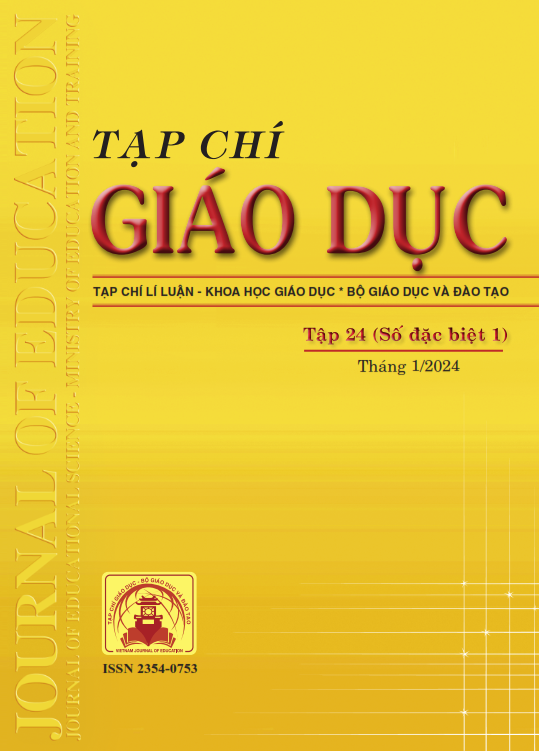Dạy học tiếng anh theo tiếp cận dựa vào nhiệm vụ tại Trường Đại học Nông Lâm Thành phố Hồ Chí Minh: một nghiên cứu thực nghiệm
Tóm tắt
Organizing English teaching for university students is a concern for many educators. It can be seen that there are many research projects conducted with the aim of finding effective teaching methods to help students improve their English skills, especially speaking skills. In Vietnam, there have also been many research projects and specific solutions aimed at supporting universities in adjusting and building general English learning programs. However, there are still many shortcomings in evaluating the effectiveness of teaching methods. Therefore, this study aims to evaluate the effectiveness of the method of organizing teaching according to the task-based approach. Through conducting experimental evaluation, the research results have confirmed that students' English proficiency improved significantly during the 12-week experiment when lecturers applied the task-based approach to teaching.
Tài liệu tham khảo
Aljarf, R. (2007). Task-based instruction for EFL struggling college writers. Asian EFL Journal, 12(3), 8-21.
Amer, A. (2019). The effect of task-based language teaching on developing EFL skills of second year school students at faculty of education (Al-Azhar). Journal of Scientific, Educational, Psychological and Social Researches, 28(1), 715-738.
Bhandari, L. P. (2020). Task-based language teaching: A current EFL approach. Advances in Language and Literary Studies, 11(1), 1-5.
Birjandi, P., & Ahangari, S. (2008). Effects of task repetition on the fluency, complexity and accuracy of Iranian EFL learners of oral discourse. Social and Behavioral Sciences, 29(2), 1950-1959.
Carless, D. V. (2001). Factors in the implementation of task-based teaching in primary school. Hong Kong: English department, Hong Kong Institute for Education.
Crook, G. (1992). Introduction. In G. Crook, G. (Eds.). Task in a pedagogical context: Interesting theory and Practice (pp.1-7). Philadelphia: Multilingual MattersLtd.
Dave, W., & Willis, J. (2007). Doing task-based teaching. Oxford: Oxford University Press.
Ellis, R. (2003). Task-based language learning and teaching. Oxford: Oxford University Press. Gorp, V. K., & Bogaert, N. (2006). Developing language tasks for primary and secondary education. Cambridge: Cambridge University Press.
Hişmanoğlu, M., & Hişmanoğlu, S. (2011). Task-based language teaching: What every EFL teacher should do. Procedia - Social and Behavioral Sciences, 15, 46-52.
Hoàng Phê (chủ biên). Từ điển tiếng Việt. NXB Đà Nẵng - Trung tâm Từ điển học. Hofler, D. B. (1983). Approach, method, technique a clarification. Reading World, 23(1), 71-72.
Kawa, S., & Nidham, L. (2023). Task-based language teaching: A pedagogical approach for improving English proficiency. OTS Canadian Journal, 2(10), 1-8.
Lantolf, J. P. (2000). Second language learning as a mediated process. Language Teaching, 33(2), 79-96.
Leaver, B. L., &Willis, J. R. (2004). Task-based instruction in foreign language education: Practices and programs. Washington: Georgetown University Press.
Levelt, W. J. (1989). Producing spoken language: A blueprint of the speaker. In C. Brown & P. Hagoort (Eds.), The Neurocognition of Language (pp. 83-122). Oxford: Oxford University Press.
Littlewood, W. (1981). Communicative language teaching: An introduction. Cambridge: Cambridge University Press.
Mackey, A., Gass, S. M., & Margolis, D. P. (2006). Second Language Research: Methodology and Design (p. 175). Lawrence Erlbaum Associates.
Nget, S., Pansri, O., & Poohongthong, C. (2020). The effect of task-based instruction in improving the English speaking skills of students. LEARN Journal, 13(2), 208-224. Nguyen Viet Hung (2014). Review of notion and framework of task-based language teaching. International Journal of English Language and Linguistics Research, 2(1), 39-48.
Nunan, D. (2004). Designing tasks for the communicative classroom. Cambridge: Cambridge University Press.
Piaget, J. (2001). Tâm lí học và giáo dục học (Trần Nam Lương, Phùng Đệ, Lê Phi dịch). NXB Giáo dục.
Prabhu, N. S. (1987). Second language pedagogy. Oxford: Oxford University Press.
Richards, J., & Rodgers, T. S. (2001). Approaches and methods in language teaching. Cambridge, UK: Cambridge University Press.
Savigo, S. (1991). Communicative Language Teaching: State of the Art. TESOL Quarterly, 25(2), 261-277.
VanPatten, B. (1996). Input processing and grammar instruction in second language acquisition. Santa Barbara, CA: Greenwood Publishing Group.
Võ Thị Khánh Linh (2016). Vận dụng mô hình CLIL và phương pháp task-based learning vào dạy học tiếng Anh chuyên ngành cho sinh viên ngành hướng dẫn du lịch ở Trường Cao đẳng Sư phạm Trung ương Nha Trang. Tạp chí Giáo dục, 372, 52-55.
Widdowson, H. G. (1978). Teaching Language as Communication. Oxford: Oxford University Press.
Đã Xuất bản
Cách trích dẫn
Số
Chuyên mục
Giấy phép

Tác phẩm này được cấp phép theo Ghi nhận tác giả của Creative Commons Giấy phép quốc tế 4.0 .












